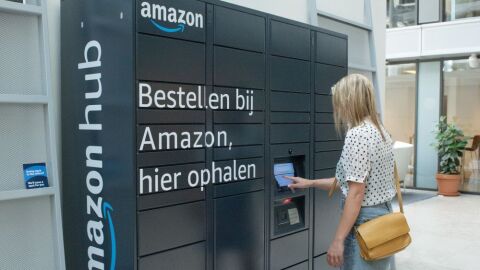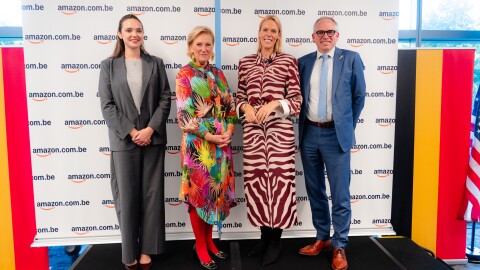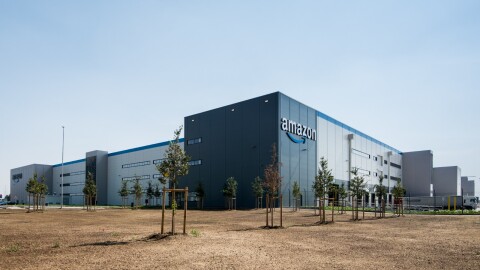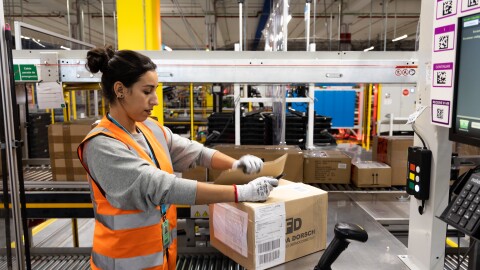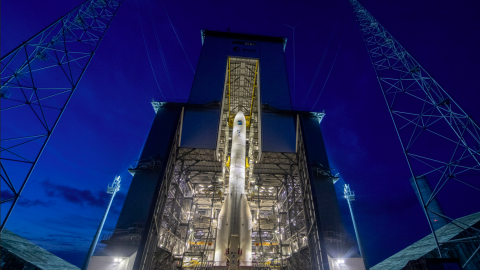Our investments in Europe and these FCs are an important source of employment for local people: more than 50% of people working in the fulfilment centres analysed had been unemployed before joining Amazon. We recently commissioned a leading research firm to analyse the economic effects of a fulfilment centre at the ‘hyperlocal’ level – in other words, focused on a particular fulfilment centre and the local district and region around it. Many of our more than 80 fulfilment centres are located in regions within EU Member States and the UK that have experienced decades of industrial decline and high levels of unemployment. The research undertaken by Frontier Economics focuses on a sample of five specific FCs across France, Germany, Italy, Spain and the UK. In headline terms, the study demonstrates that Amazon’s FC investments have resulted in measurable positive (direct and indirect) economic and employment effects at the district and regional level around each of the fulfilment centres.
In 2021, gross salary payments to employees amounted to an average of €83.3 million per fulfilment centre. A local payroll of this size has a cumulative effect over time. For example, at the FC in Saran, France – the longest-standing among the five FCs examined – these payments add up to over €700 million since the FC’s expansion in 2013[1] – a significant economic contribution at a local level. Beyond employee wages, we also made capital investments of €83.2 million on average across the lifetime of the fulfilment centres examined in the study. This included purchasing goods and services from local suppliers; for example, local partnerships to provide training for Amazon employees and to service Amazon vehicles and machinery. Each of the FCs employs on average 1,500 people, and this accounts for up to one in six jobs in the municipalities where these fulfilment centres are located. In addition, each centre supports an average of 250 additional jobs among supplier and partner firms in the local area[2].
We encompass an entire universe of roles across a diverse range of backgrounds, qualifications and aspirations - from those starting work with fewer skills to more experienced people. We have more than 60 different roles in our FCs, from engineers to IT, procurement and HR specialists, finance and safety professionals to quality controllers, and the teams that pick, pack and ship customer orders. All this means there is a potential role for everyone. The Frontier Economics study also examined the prior employment background of the workforce in each of the FCs. It found that Amazon’s fulfilment centres are a source of employment for people who had previously found it difficult to find work locally, and a gateway into the world of work for people who are new to the wider workforce. More than 50% of people working in the FCs had been unemployed before joining Amazon - including as many as 71% in Spain. In addition, between 7% (UK) and 18% (Spain, France) had never previously been employed anywhere before they began working for Amazon[3].
Over time, Amazon’s FC investments can also help to stimulate and support broader local transformation in areas where key socioeconomic indicators are lower than elsewhere. For example, our fulfilment centre in Winsen (Hamburg), Germany, is located in an area where, since its launch in 2017, we have provided €344.9 million in wages to the FC employees, much of which is in turn spent within the local community. We also spend around €95 million a year operating the fulfilment centre, which includes contracts with local suppliers and partnerships with local businesses. There were just under 1,500 people working at the fulfilment centre as of the end of 2021, and the FC accounted for around 11% of all employment in the area. It’s also estimated the fulfilment centre has supported the creation of an additional 190 jobs locally since 2017.
The study found similar metrics for our FC in Torrazza Piemonte, Italy. The centre employed just over 1,600 people as of the end of 2021 - up from 442 employees at the end of 2019. The FC is a major employer in the local area. The Amazon FC workforce is greater than the total number of residents of the municipality estimated to be in employment (based on Eurostat data for the Piemonte region and data from the Italian Istituto Nazionale di Statistica), and therefore also attracts employees from neighbouring municipalities. Cumulative wages paid since 2019 amount to around €246 million, which is a significant source of income for the local community as a whole. Additionally, it’s estimated the FC now supports around 310 jobs locally (including through supplier and partnership relationships) beyond the fulfilment centre workforce itself.
Direct support for local communities
At each of our fulfilment centres, Amazon seeks to be a good neighbour, playing an active role in helping the local community. We have numerous partnerships and charity relationships at the local FC level. In many cases, those relationships can have a tangible effect for large numbers of locals over time. For example, at the fulfilment centre in Winsen, Amazon’s monetary and in-kind donations to local charities between January 2020 and June 2022 reached almost 18,000 people in the community – that’s around 50% of the total local population. Similarly, Amazon’s FC in Illescas, Spain, provides direct support for more than 30 local NGOs. These activities are in addition to Amazon-wide programmes delivered locally to support vulnerable groups in Europe. You can read more about how we’re supporting communities throughout the EU and UK.
Helping local small businesses

Our economic contribution at a community level isn’t simply limited to our investment in fulfilment centres and (indirectly) in the local suppliers and partners who support our FCs. A significant proportion of the selling partners on Amazon are small and medium enterprises (SMEs), many of whom – like our FCs – provide an important source of employment and income. We regularly conduct research across the Amazon sellers community to understand how we can best help our partners grow their own businesses. During 2021 (the most recent year for which data is currently available), we found that European SMEs sold more than 2.2 billion products to Amazon customers worldwide. Their combined export sales were more than €14.5 billion in 2021 – a 10% increase on export volumes for the previous year.
Helping small businesses access a pan-EU and global marketplace – far beyond the sales boundaries of a typical local merchant – has significant economic and employment effects. Higher export volumes (and therefore higher overall sales) often generate employment opportunities as selling partners create new roles to manage increased production and logistics demands. Our research indicates that, in 2021, SMEs selling on Amazon created more than 100,000 new jobs in Europe, including new roles in districts and regions with key socioeconomic indicators below the national average. Over the same period, we invested over €3.4 billion exclusively on supporting SMEs through services, tools and programmes designed to make it easy for even the smallest ‘kitchen table’ business to sell to Amazon customers worldwide and our ASBA free programme helped more than 650,000 European entrepreneurs to digitise their businesses.
[1] The study focuses on the impact of the fulfilment centre in Saran in France after 2013 when a significant expansion was completed.
[2] This is likely to be a conservative estimate as it only includes jobs created within the local area (and therefore excluding those further afield) and it is likely not to include jobs (direct and indirect) that can be linked through statistical analysis to the increase in logistics employment observed following the opening or expansion of the logistics sites. Moreover, this estimate does not include jobs created through construction work at the Amazon sites. We are not able to estimate what proportion of the additional jobs are permanent versus temporary.
[3] This analysis includes UK, Spain, Italy and France due to data limitations for German fulfilment centre.




